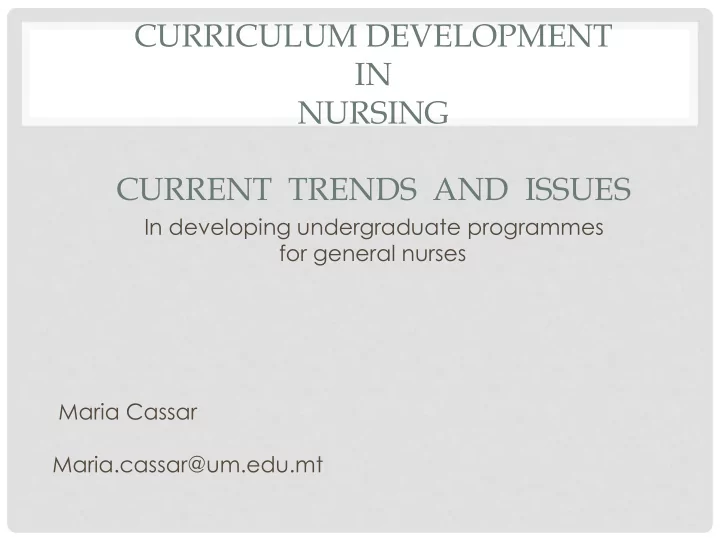

CURRICULUM DEVELOPMENT IN NURSING CURRENT TRENDS AND ISSUES In developing undergraduate programmes for general nurses Maria Cassar Maria.cassar@um.edu.mt
PILLARS OF CURRICULUM DEVELOPMENT INCLUDE A PHILOSOPHY , A MISSION, A SET OF VALUES AND A TIME FRAME Do and should philosophies differ across contexts? ( Instrumentalism, Humanism, Progressivism, Reconstructionism) Is a consistent set of values common across contexts? Should a curriculum reflect the philosophy of the educational entity or of the nurse educator? Does a time frame need to be identified? WHY? What are the assumptions unpinning a curriculum?
CURRICULUM DEVELOPMENT RESPONSIVE TO PREVALENT REALITY • Curriculum in nursing des not exist in isolation. What is reality? -Reality is dynamic, transient, unpredictable, varied What does this mean for nurse education? -Curriculum Development needs to enable the development of nurses who are able to respond to dynamic , transient, unpredictable and varied health care systems and patient/ client groups How? Are there core elements which are common across realities. If so which are these? Which are relevant to a specific context?
CULTURAL DIVERSITY EMBRACED AS A SCOPE AND A CHARACTERISTIC AND AS AN OUTCOME OF CURRICULUM DEVELOPMENT • Why? • How?
CURRICULUM DEVELOPMENT NEEDS TO BE TUNED TO DEMOGRAPHIC CHANGES Increase of Older Persons: A global phenomenon?! Maternity and Child Care: Challenges universal?! What are the prevalent and predicted demographic changes of a country? How may these be determined? Should these be the cornerstone of a programme or not?
CURRICULUM DEVELOPMENT NEEDS TO PROVIDE SKILLS AND KNOWLEDGE CONSISTENT WITH EPIDEMIOLOGY • Incidence and prevalence of chronic diseases: A international challenge?! • Infectious diseases: a global concern?!
CURRICULUM DEVELOPMENT IS TO BE CONGRUENT WITH MODELS OF HEALTH CARE SYSTEMS -Shift away from hospital based care -Expansion and extension of community based care, including mental health and maternity services -Emphasis on primary health with a focus on health promotion and health education in view of empowering patients Are all health care systems adopting the above ?! May all health care systems adopt all of the above? May generic nurses really address all these facets of a health care system?
CURRICULUM DEVELOPMENT IS TO REFLECT ADVANCE S MADE IN INFORMATION TECHNOLOGY -Within the organisation and delivery of a training programme? □ -Within the content of a curriculum? □ -Both of the above? □ Implications include challenges with costs for training, and equipment used in a very dynamic setting. Sustainability
CURRICULUM DEVELOPMENTS MAY NEED TO REFLECT CHANGES IN SOCIETAL, RELIGIOUS AND POLITICAL CONTEXTS • Substance abuse • The family • The female • Different religions • Different political ideologies
CURRICULUM DEVELOPMENT SHOULD BE IN TANDEM WITH DEVELOPMENT IN PROFESSIONAL SCOPE AND ROLE OF THE NURSE • Are scope and role of the nurse consistent across time and place? • Should the scope and role of the nurse be consistent across time and place?
CURRICULUM DEVELOPMENT DRAWS UPON EVIDENCE AND IS PINNED TO RESEARCH • -The organisation and delivery of a training programme should be researched and evidence based? □ • -The content of a curriculum should enable nurses to based their practice on evidence and engage in research? □ • -Both of the above? □ Implications include challenges with costs for training, and equipment used in a very dynamic setting. Sustainability
CURRICULUM DEVELOPMENT OF UNDERGRADUATE ACADEMIC PROGRAMMES : ONE STEP ON A LADDER Vocational training and permeability to academic training programmes Post-graduate and post qualifications Are these always perceived as steps above and below the degree step? Is it feasible/ possible to plan, and moreover to achieve these steps? What are the costs?
HOLISTIC APPROACH… IN CURRICULUM DEVELOPMENT INTERDISCIPLINARY APPROACH.. ETC ETC ETC ETC ETC ETC ETC ETC ETC Legal aspects of care ( surge in suing culture) Ethical concerns and challenges Economics of health care ( increased managerial / administrative elements in nursing practice) Financial understandings of health care ( increased managerial / administrative elements in nursing practice) May generic nurses realistically address all these facets of the role of the nurse?
EQUAL DISTRIBUTION OF CLINICAL AND THEORETICAL COMPONENT ACROSS A CURRICULUM • What is Clinical Teaching and Learning? What are the challenges with: -clinical learning environments? ( quantity and quality) -simulated environments? -teaching by clinical staff? -clinical competence of academics? How may such challenges be addressed in an affordable and effective way?
OUR EXPERIENCE IN MALTA Theoretical component ( 2,300 of teaching and learning) -EU directive -Maltese legislation while embracing all religions and cultures -Political direction - a main navigator -Local role and scope of nurse – main determinant -Demographic and epidemiological data guides content -All sectors of health care services despite shift to community -Interdisciplinary and integrated approach away from medical model -IT – a teaching tool and a learning outcome -Searching and using research evidence – a core element -Steps in the ladder continually and progressively added
OUR EXPERIENCE IN MALTA • Clinical component ( 2300 of teaching and learning) - Clinical areas and simulated clinical environments and clinical skills labs used - Clinical staff as trained mentors of students - Clinical staff as instructors in simulated environments and skills labs - Academic staff involved in assessment of clinical components
CURRICULUM DEVELOPMENT IN CAIRO WHICH ARE THE MOST RELEVANT TRENDS AND ISSUES? -Philosophy, mission, values and time Professional Scope and Role of the period + Assumptions Nurse -What is the reality? Research and Evidence- based Demographic, Epidemiological practice • trends Culture, Politics and Religion Educational/ Qualification Ladder • -Model/s of health care systems Overarching approach ( holistic, intergrated, interdisciplinary) -Information Technology Clinical vs Theoretical component
Recommend
More recommend